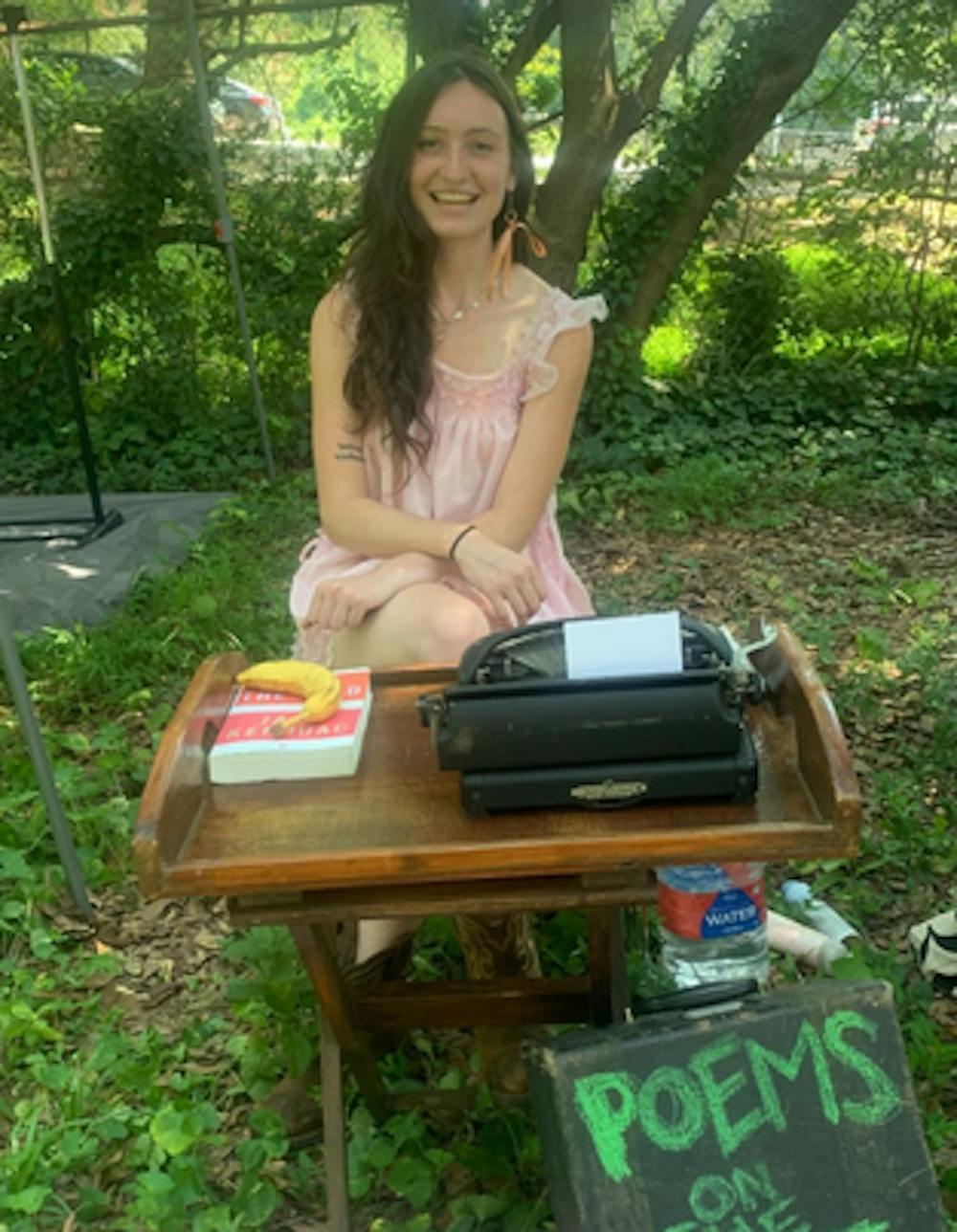While most Emory University students exist in Atlanta, Mads Gordon (24C) has truly lived here. They’ve dabbled in the city’s arts community, advocated for local issues, explored beyond Druid Hills and drawn local media coverage for their poems-on-the-spot project and PEACHFUZZ literary journal. A recent Emory alum, Gordon hails from Thomasville, Ga., a town of 19,000 that sits about 13 miles north of the Florida-Georgia border. Their poetry drips with the Southern gothic, transporting readers from the gridlocked city to a land of horses, porch swings and devout Christianity.
Gordon’s upbringing in South Georgia plays an autobiographical role in their poetry, with much of their writing taking place in a pasture — “a patch of grass that’s your own, that’s still and quiet,” they said. Inspired by a childhood spent trekking down a dirt road to their grandmother’s house and running around in the forest with their brother, Gordon’s poetry evokes a time and place miles away from Atlanta, where everybody knows each other.
“The neighbor boy spit in / my eye last June. Where / old lady grows calla lilies / in white domes for Easter / and funerals,” Gordon wrote in the poem “Guilty Pleasure.”
Themes of land and nature appear throughout Gordon’s oeuvre and bleed into their life outside of poetry. An advocate for the Stop Cop City movement, a love of the outdoors drove Gordon to oppose the construction of the Atlanta Public Safety Training Center, commonly known as “Cop City.”
“A big part of being involved in that movement was feeling really heartbroken that there was this one patch of old land, land that actually hadn't been destroyed yet and hadn't been paved over, and then knowing that that was gonna be f***** up,” Gordon said.
Advocacy and poetry go hand-in-hand for Gordon, who said their political awareness stems from their “working-class” upbringing where social justice issues were close to home. Poetry is, for Gordon, a vehicle for telling the world about injustices.
“The job of the poet is to witness and then to report back with complete truths,” Gordon said.
This led them to join a pro-Palestinian encampment on the Quadrangle last April, which the Emory Police Department, Atlanta Police Department (APD) and Georgia State Patrol quickly shut down. Law enforcement arrested 28 people — Gordon was one of them.
“I’m not a revolutionary,” Gordon said. “I purely went out there from the viewpoint of the overarching desire for the Palestinian people to have liberation and self-determination.”
Gordon lost their smartphone in the arrest but held on to a copy of “The Wild Iris” (1992), a poetry collection by Louise Glück that touches on spirituality, the natural world and humanity. In the hot transport van, they fanned another detainee with the book. In jail, they read it out loud to others.
“You can always go back to the Word of God in tough times and return to it,” Gordon said. “Poetry is doing the same thing for me.”
Gordon, who’s dealt with incarceration in their family, said the American penal system is geared to strip people of their humanity and their autonomy. They credited their ability to sit and read and write a poem in their head as a way to maintain autonomy. Gordon’s view of poetry as a profession is all-encompassing — for a poet, poetry is a sustaining life force.
Poetry is almost a religion for Gordon: it’s their guide for moving through the world. Gordon, who majored in religion and English and creative writing, was raised Southern Baptist. When they moved away from religion, poetry filled the gap. Their interest in religion, specifically the creation story and what it means to be fallen from God, is present throughout their oeuvre.
“I stilled & shook like / rigormortis til all the angels heard & / took pity & then they carried me home,” they wrote in “Purgatory.”
Gordon also formed a congregation of sorts, running a poetry group called the Atlanta School of Poets and starting an Atlanta-based literary journal called PEACHFUZZ alongside their friend and collaborator Sophia Tone. Gordon and Tone spent the summer on the Atlanta Beltline, busking poems for tips, until APD officers shut down their operation.
“APD hates freethinkers,” Gordon said.
They told the police that they weren’t technically selling the poems, instead just working for tips. The officers didn’t care and told Gordon they needed a permit.
““It was very bad,” Gordon said. “I was being an ass, quite honestly. I was like, ‘Sorry, we're f****** terrorists on our typewriters.’”
They didn’t stop writing, though. Instead, Gordon and Tone relocated their poems-on-the-spot project to Findley Plaza in Little Five Points, in front of Southern Star Tattoo.
Armed with a hammer and a white Nokia phone, Gordon cranked out poems on a typewriter. They encountered businesspeople, high schoolers and a flasher who exposed himself while reciting Lewis Carroll’s “Jabberwocky” (1871) — the good, bad and ugly of Atlanta. They lived off-campus as an upperclassman, exploring Cabbagetown and East Atlanta Village, building a community through the Atlanta hardcore scene and collectives like the Lake Claire Community Land Trust.
“Emory is… not the whole world, and it's not the biggest, most important part of my life at all, right now,” Gordon said about experiencing the city outside of the University. “In the grand scheme of things, there's a lot going on that's way more interesting, and that I am more interesting than what I'm doing at Emory.”

Sophia Peyser (she/her) (25C) is from New York City, majoring in creative writing and environmental science. Outside of the Wheel, Peyser has worked as a content writer and freelance journalist. You can find her reading Sally Rooney novels or working shifts at a Brooklyn bakery.






